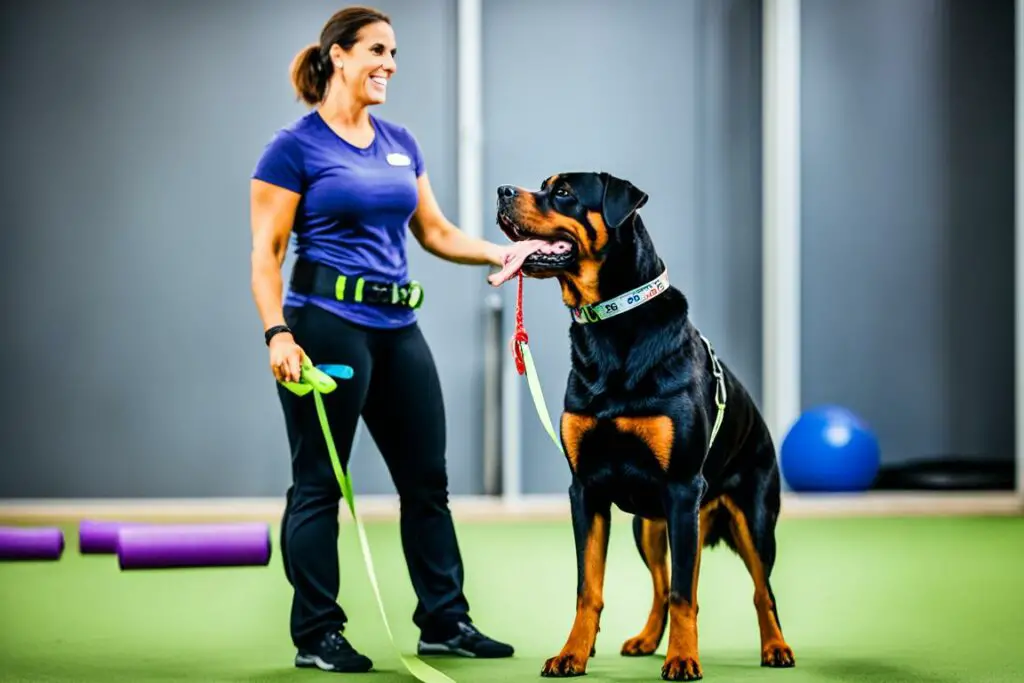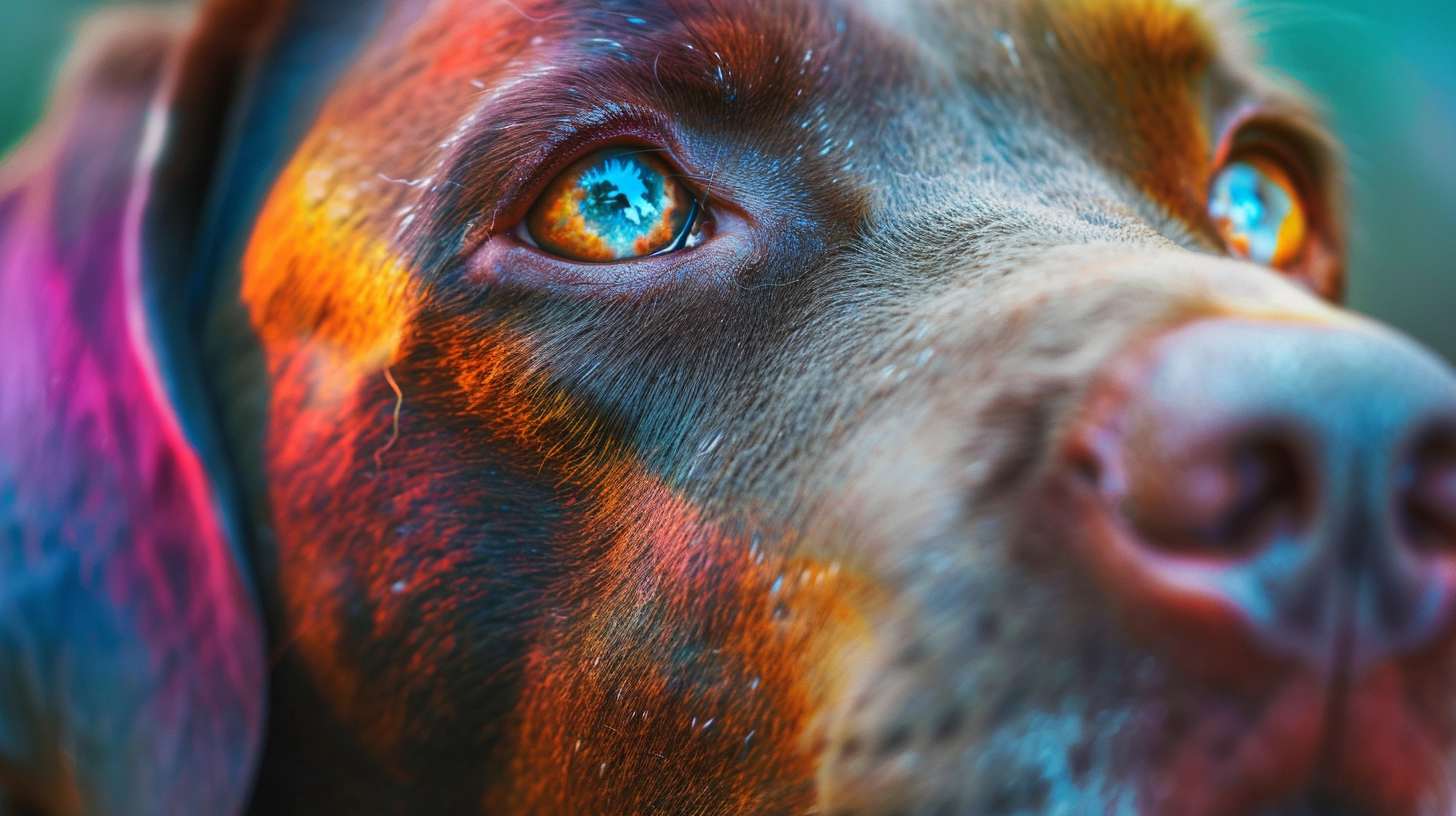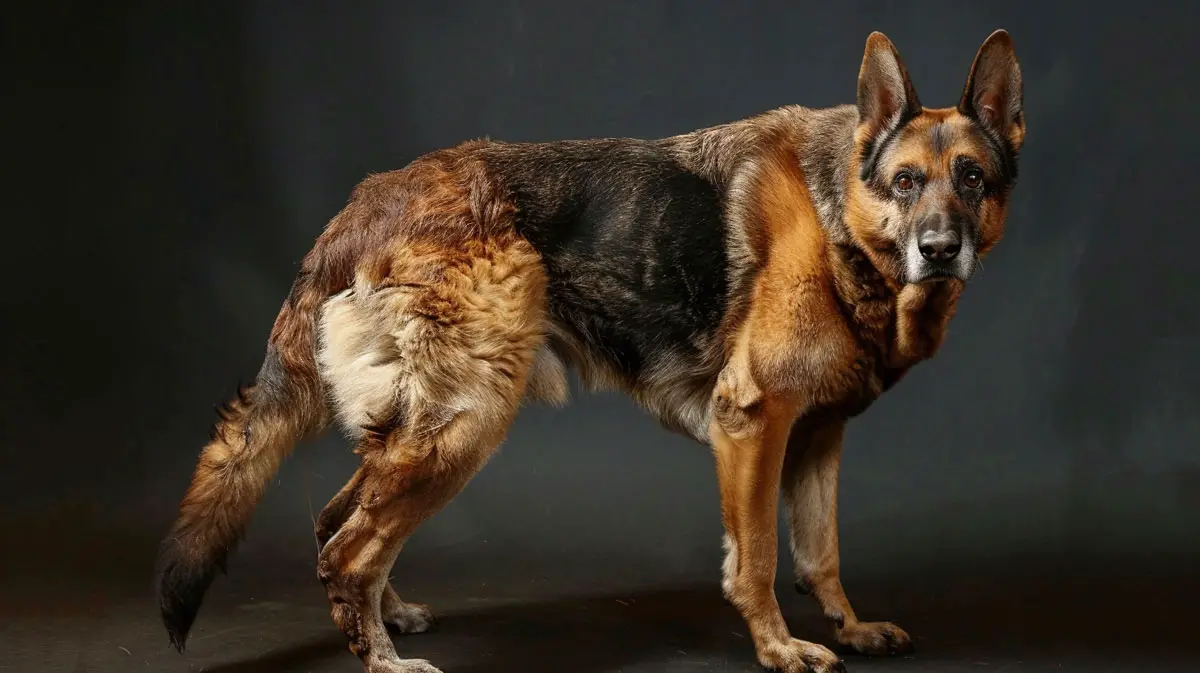Rottweilers are known for their loyalty and bravery. However, they are also prone to certain health issues. It’s critical to take good care of their health. This guide will give you valuable advice to keep your Rottweiler healthy and happy.
Key Takeaways:
- Proper training and socialization are essential to prevent aggression in Rottweilers.
- Rottweilers require daily exercise and mental stimulation to avoid boredom.
- Regular veterinary check-ups and a balanced diet are vital for their well-being.
- Grooming a Rottweiler is relatively low-maintenance, with regular brushing being important.
- Positive reinforcement techniques work best when training a Rottweiler.
Rottweiler Characteristics and Temperament
Rottweilers are a breed known for their unique traits and temperament. They are one of the oldest herding types. These dogs have strong bodies and personalities. Anyone looking to own a Rottweiler should learn about them first.
Rottweiler Characteristics
Rottweilers are big, strong, and muscular. Male Rottweilers usually weigh 95-135 pounds, and females weigh 80-100 pounds. They have a heavy build, a wide chest, and they move powerfully. Their short coat is black with mahogany marks on their face, chest, and legs.
These dogs are also loyal and love their families deeply. They form strong bonds with their owners. This makes them great protectors and family pets.
Rottweiler Temperament
Rottweilers blend confidence, loyalty, and smarts. They appear calm and confident. This makes people feel safe. Yet, they’re careful around new people. Early socialization helps prevent aggression.
They are protective but listen well and learn fast. Their smartness and desire to please help in training. Proper training and early socialization are key.
Though loving, Rottweilers can be stubborn. Training needs to be consistent and firm. Use patience, positive reinforcement, and rewards to teach them well.
Rottweilers need regular exercise and mental challenges. They are big and need to stay active. Daily physical activity is crucial. Activities like walks, runs, and games keep them fit and happy.
Rottweiler Health Issues
Rottweilers are known for their strength and loyalty. They are loved companions with a unique look. However, they face some health issues that are common in the breed. Knowing about these issues helps owners take good care of their pets.
Cancer: Rottweilers can get different kinds of cancer, such as bone cancer and lymphoma. Regular vet visits and finding it early are key for treatment.
Cataracts: They might get cataracts which cloud their vision. It’s important to have their eyes checked often to catch this early.
Dental Disease: Bad dental hygiene can lead to gum disease and tooth loss. Brushing their teeth and getting them cleaned by a professional is necessary.
Digestive Disorders: Some Rottweilers have food allergies or bloat. A balanced diet and avoiding bad foods can help manage these issues.
Eye Injuries: Due to being active, they can hurt their eyes. If this happens, they need to see a vet right away.
Hip and Elbow Dysplasia: These joint problems are common in Rottweilers. Keeping them active, at a healthy weight, and breeding properly can reduce risks.
Joint Disease: As they get older, they may get arthritis. Regular exercise and joint supplements, if a vet recommends them, can help.
| Common Health Issues in Rottweilers |
|---|
| Cancer |
| Cataracts |
| Dental Disease |
| Digestive Disorders |
| Eye Injuries |
| Hip and Elbow Dysplasia |
| Joint Disease |
Neurological Disorders: Some Rottweilers might have epilepsy or other nerve issues. Talking to a vet can help manage these problems.
Obesity: They can easily gain weight without enough exercise and the right diet. Keeping an eye on their weight and staying active prevents obesity.
Parasites: They can get fleas, ticks, and worms. Using parasite prevention like topical treatments and deworming is critical.
Spaying or Neutering: It’s a way to control the pet population, but it changes hormone levels. Talking with a vet about the risks and benefits is wise.
Thyroid Problems: Some may have thyroid issues, like hypothyroidism. Blood tests and medication, if needed, can manage this condition.
Regular vet check-ups and noticing health issues early are crucial for Rottweilers’ health. Giving them a proper diet, exercise, and care lowers health risks. With the right care, Rottweilers can live happily and healthily.
Caring for Your Rottweiler
To keep your Rottweiler healthy and happy, proper care is needed. This includes regular exercise, mental challenges, and a good diet. These steps can help your pet enjoy a full and joyful life.
Exercise and Mental Stimulation
Rottweilers are a lively bunch needing daily exercise to stay fit. They should get at least an hour of exercise every day. This can be through walks, runs, or playing in a safe place. Offer them puzzle toys or play interactive games. This keeps them sharp and stops bad behavior.
Grooming Tips
Rottweilers are low maintenance when it comes to grooming because of their short coat. Brushing them regularly helps remove loose fur and keeps them looking great. Bathe them with a gentle dog shampoo as needed. Always trim their nails and clean their ears to avoid infections.
“Regular exercise and grooming are crucial for a healthy and happy Rottweiler.”
Proper Nutrition
Nutrition is key for your Rottweiler’s health. Pick top-notch dog food that matches their age, size, and how active they are. Avoid giving them too much food to prevent obesity. Obesity can cause health issues. Talk to your vet about how much and how often to feed your pet.
Veterinary Check-ups
It’s important to take your Rottweiler for regular vet visits. Check-ups can catch health problems early, which means faster treatment. Your dog should be up to date with vaccines and protected against parasites. Don’t forget about dental care, too.
| Care Tips | Grooming Tips |
|---|---|
| Provide regular exercise. | Regularly brush their coat. |
| Keep them mentally stimulated. | Bathe when necessary using a mild dog shampoo. |
| Provide a balanced diet. | Trim their nails regularly. |
| Schedule regular veterinary check-ups. | Clean their ears. |
By making these care practices a part of your daily routine, your Rottweiler will stay in good health. They will be content and flourish for many years.
Rottweiler Training Guide
Training your Rottweiler is key to their health and happiness. These dogs are smart and love to please. Stick to consistency, positive reinforcement, and start socializing them early for the best results.
**Rottweiler training guide** emphasizes starting with basic commands. Words like sit, stay, come, and down are essential. Use rewards and praise to encourage them. Rottweilers love this positive approach and do well with it.
Socializing your **Rottweilers** early is important. They need to meet different people and animals and visit new places. This makes them more confident and well-behaved.
**Crate training** is a must in training. Introduce them to a crate early. Make it a comfy place for them. This helps with potty training and gives them a safe spot.
Professional Training
Training at home is great, but sometimes, you need a pro. A good dog trainer can really help you and your dog. They know how to tackle hard training problems.
Working with a professional trainer makes things easier. They guide you through tough spots and offer methods that work best for your Rottweiler.
Tips for Successful Training
Here are some key tips for **Rottweiler training**:
- Be consistent with training sessions and commands.
- Use positive reinforcement techniques such as treats, toys, and praise.
- Keep training sessions short and frequent to maintain engagement.
- Make training sessions fun and interactive for your Rottweiler.
- Be patient and avoid punishment-based training methods.
Understand that every Rottweiler is different. Adjust your training to fit their personality. Always praise their achievements and keep the training positive.

Training your Rottweiler is a beautiful path that brings you closer. By using this **Rottweiler training guide**, you’ll end up with a well-trained, obedient, and joyful dog.
Rottweiler Grooming Tips
Grooming a Rottweiler is relatively simple. They need regular brushing to remove loose hair. This prevents matting. Brushing makes their coat neat and spreads natural oils. This keeps their skin healthy and makes their coat shiny. A bristle brush or a rubber curry brush works well for this.
Pro Tip: Start brushing your Rottweiler early to get them used to it. Always use treats and praise during grooming to make it enjoyable.
Bathing them only when needed is key, using a mild dog shampoo. This protects their skin’s essential oils. Too much bathing can dry out their skin and cause irritation. Make sure all the shampoo is rinsed out to avoid skin problems. For bathing frequency, it’s wise to ask a vet.
Trimming their nails is crucial. Long nails can hurt them and cause issues. Use specific dog nail clippers for this. Only trim the tip of each nail to avoid the quick. If nail trimming is unclear, it’s best to see a professional groomer or a vet.
Pro Tip: Check and clean their ears regularly to avoid infections. Use a gentle cleaner and cotton balls for the outer ears. Don’t insert anything deep into their ears to prevent damage.
| Grooming Tasks | Frequency |
|---|---|
| Brushing | Once or twice a week |
| Bathing | When necessary |
| Nail trimming | About once a month |
| Ear cleaning | Once a week or as needed |
| Teeth brushing | At least twice a week |
Dental care is also vital. Brushing their teeth regularly prevents dental problems. Always use dog-specific dental products to clean their teeth. This will keep their breath fresh.
Grooming a Rottweiler keeps them looking great and healthy. By applying these tips, your Rottweiler will stay clean and joyful.
Rottweiler Breed History
The Rottweiler breed has a rich past that goes back to ancient Rome. Romans used these dogs to drive cattle. They were loved for their good behavior, strength, and smarts in herding and protecting animals. Later, these dogs were refined in Rottweil, Germany, where they got their name.
Rottweilers had other jobs too. They worked as guard dogs, helped pull carts, and even saved lives in rescue missions. They could do many tasks well, making them very helpful.
These dogs were one of the first to help guide blind people. Their protective nature, smartness, and easy training made them great at helping those without sight.
“Rottweilers have a long-established heritage as hardworking and dependable dogs.” – Rottweiler enthusiasts
Rottweilers have kept their look and behavior through the ages. They are strong, muscled, and loyal, known for their protective ways.
Now, Rottweilers are loved as family pets, working dogs, and faithful friends. Their long history has shaped them into the amazing breed we know today. They are known for their strength, smarts, and loyalty for centuries.
Key Milestones in Rottweiler Breed History
| Period | Milestones |
|---|---|
| Ancient Rome | Used as cattle-driving dogs by the Roman legions |
| Germany, Town of Rottweil | Further development of the breed and acquisition of the name “Rottweiler” |
| Historical Periods | Served as guard dogs, draft dogs, rescue dogs, and guide dogs for the blind |
| Present | Beloved family pets and esteemed working dogs |

Rottweiler Feeding and Diet
Feeding your Rottweiler a balanced diet is key to their health. It gives them the nutrients they need for growth, energy, and a strong immune system.
Rottweiler puppies need special puppy food until they are 12 months old. This food has the right nutrients for their growing bodies. Look for high-quality puppy food made for large breeds.
When a Rottweiler becomes an adult, switch to adult dog food. This meets the needs of fully grown dogs. Choose a quality food made for big breeds, like Rottweilers.
Pick dog food with real meat as the top ingredient. Avoid foods with lots of fillers and artificial stuff. Reading the ingredients helps you pick a healthy diet for your Rottweiler.
Portion control is very important. Overfeeding can cause obesity and health problems. A vet can help figure out the right amount of food based on age, activity, and health.
Feeding Schedule
It’s important to have a regular feeding schedule for Rottweilers. Split their food into two or three meals a day to prevent overeating and digestive problems. Regular meals help keep their energy stable and stop hunger-related behavior issues.
Treats and Supplements
Be careful with treats. Pick healthy, low-calorie options that don’t lead to weight gain. Give treats in moderation and keep an eye on their daily calories.
Talk to a vet before adding supplements to your Rottweiler’s food. Usually, balanced, quality dog food has everything they need. Sometimes, supplements can help with joints or for a shiny coat.
Consult with a Veterinarian
Each Rottweiler is different, and so are their food needs. A vet can give advice tailored to your dog. Regular vet visits make sure their diet is on track and check for health issues.
Providing a balanced diet is essential for your Rottweiler’s health. With the right food and schedule, your Rottweiler will stay healthy, happy, and energetic.
Rottweiler Exercise and Mental Stimulation
Rottweilers need regular exercise and challenges to stay healthy. They should get 60 minutes of activity daily. This helps avoid boredom and restlessness.
For their brains, Rottweilers need mental exercises too. Training them commands keeps their minds active. Use treats and praise to motivate them.
“A well-exercised and mentally stimulated Rottweiler is a happy Rottweiler.”
Puzzle toys and games help their thinking skills. These can have treats inside, making them search. This keeps them busy and prevents bad behaviors.
Agility Training and Nose Work
Agility training challenges Rottweilers physically and mentally. They go through obstacles, which tests their skills. It also strengthens your bond with them.
Nose work is good for their brain. They use their sense of smell to find things. Start with hidden treats at home then move to more advanced tasks.
Summary
- Ensure your Rottweiler gets at least 60 minutes of exercise every day.
- Provide mental stimulation through training sessions and interactive toys.
- Engage in activities like agility training and nose work to challenge their instincts.
Making sure your Rottweiler is active and mentally challenged keeps them happy. This leads to a healthy, well-mannered dog.
Rottweiler Socialization and Behavior
It’s vital for Rottweilers to learn good behavior and how to interact well. This starts the moment a puppy arrives at its new home. By exposing them to various settings, people, and animals, they grow up to be confident and well-adjusted.
“Early socialization plays a significant role in shaping a Rottweiler’s behavior throughout their life. It helps them become accustomed to various stimuli, reducing the likelihood of fear or aggression,” says Dr. Kate Anderson, a renowned canine behavior expert.
Use positive ways to teach them right from wrong. Give treats, praise, and love for good actions. This not only rewards them but also strengthens your bond.
Socializing Rottweilers:
- Introduce them to different people, including strangers, friends, and family members, to help them feel comfortable around unfamiliar individuals.
- Expose them to various animals, such as dogs of different sizes and temperaments, cats, and other household pets, under controlled and supervised conditions.
- Take them to different environments, including parks, neighborhoods, pet-friendly stores, and busy streets, to help them adapt to different surroundings.
- Enroll them in puppy socialization classes to provide regular interactions with other puppies and learn appropriate play behavior.
A Rottweiler’s protective instinct means early socialization and training are key. Teaching them basic commands like sit, stay, and come, sets clear boundaries. It makes them a well-behaved family member.
Rottweiler and Children/Other Pets
Rottweilers make excellent family pets and can deeply bond with kids if trained and socialized well. They are loyal and gentle, often feeling a strong urge to protect their family. This includes the younger members.
But remember, Rottweilers are big and strong. Even with the best intentions, they might accidentally knock over a small child. So, always keep an eye on interactions between your child and your Rottweiler.
Early socialization and training teach Rottweilers to be patient and careful around kids. They learn to be calm and respect boundaries. Positive reinforcement helps them know how to behave appropriately.
“With proper socialization and training, Rottweilers can coexist peacefully with other pets in the household.”
Rottweilers can get along well with other pets too. But be careful when introducing them, especially if they’ve never been around other animals.
Introduce Rottweilers to new pets slowly and under close watch. Make sure the environment is controlled. Use treats and praise to encourage friendly behavior and to avoid any fights.
Each Rottweiler is unique and may act differently. Always consider what’s safest for your pet and children or other pets. If you’re unsure, ask a pro dog trainer for advice.
Conclusion
Taking care of a Rottweiler brings many joys. It requires the right training, meeting their social needs, and regular exercise. A balanced diet is also key. By using this guide, you make sure your furry friend stays well and happy.
It’s vital to keep an eye on your Rottweiler’s health. You should do regular vet visits. This helps catch and treat any health problems early.
Rottweilers give back much love and loyalty to their owners. With proper care, they turn into devoted, loving friends. Use the tips in this guide to give your Rottweiler a loving home. This lets them live a fulfilled and happy life.
Remember, every Rottweiler is different. Always talk to a vet to get advice that fits your dog’s needs. Putting time, effort, and love into their care deepens your bond. You’ll enjoy many happy years together. Here’s to your Rottweiler’s healthy, joyful life!





Leave a Reply